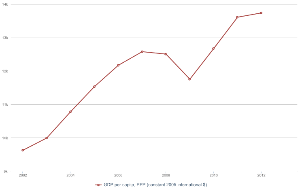Government's Struggle for Hegemony Fuels Doubts About the AKP's Democratic Values
By Orhan Bursali (vol. 2, no. 6 of the Turkey Analyst)
 Turkey’s ruling Justice and Development party (AKP) has won two consecutive elections and is now in its eighth year in power. Since the AKP’s leaders came from an Islamist political background, doubts about the sincerity of its adherence to the principles of the democratic system have lingered on among the opposition. These suspicions have been fed by the controversial policies of the AKP, and in particular by its sustained effort to concentrate power in the hands of the executive branch.
Turkey’s ruling Justice and Development party (AKP) has won two consecutive elections and is now in its eighth year in power. Since the AKP’s leaders came from an Islamist political background, doubts about the sincerity of its adherence to the principles of the democratic system have lingered on among the opposition. These suspicions have been fed by the controversial policies of the AKP, and in particular by its sustained effort to concentrate power in the hands of the executive branch.
The Season of the AKP's Disorientation
By Haluk Sahin (vol. 1, no. 18 of the Turkey Analyst)
Turkey is moving towards local elections in March of 2009 in a state of disorientation and flux. The ideological deck of Turkish politics is once again about to be reshuffled. The ruling AKP’s room for political maneuver is seriously curtailed, which creates new opportunities for the opposition parties.
The Turkish Military's Puzzling Silence
By M.K. Kaya and Svante E. Cornell (vol. 1, no. 10 of the Turkey Analyst)
Turkey’s military occupies a position of influence in the country’s society and politics unseen in any other western democracy. However, in spite of a propensity to interfere in politics, the top brass has remained relatively quiet in the past year, while the driving force in the vocal opposition to the AKP government has been the judiciary. But given the growing intensity of Turkey’s regime crisis, illustrated by the July 1 arrests, it remains to be seen whether the military can succeed in staying out of this fight.
Welfare Policies are the Key to the AKP’s Electoral Successes
By Kemal Kaya (vol. 7, no. 8 of the Turkey Analyst)
Redistribution through social services and welfare programs is a crucial source of electoral strength for the Justice and Development Party (AKP). However, this model for political success also strains the relation between the AKP and those societal segments that support the welfare programs with their taxes. The results of the March 30 elections demonstrate that support for the AKP is declining among the newly urbanized, conservative middle class, and show that the party faces a new challenge, not unlike the one that has been faced by European social democratic parties in government.

What the Columnists Say
The speech that Haşim Kılıç, the president of the Turkish Constitutional Court, gave at the 52th anniversary of the founding of the court, sharply criticizing the government for the purges in the judiciary, has been widely castigated by pro-government commentators. Kılıç, a religious conservative, is condemned as a “traitor” to the cause of the Islamic conservatives. More cautious commentators observe that Kılıç has pointed to a real problem, but nonetheless make the case that Kılıç and the court needs to dispel the impression that it is taking sides in the power struggle between the government and the supporters of Fethullah Gülen.




